This internet site is supported by our referee . We may earn a mission , at no toll to you , if you purchase through link .
Your Aussie ’s tail is a happy wag most of the time , but sometimes it can be a source of pain and injury .
As anAustralian Shepherdowner , it ’s important to understand whentail amputationmight be needed due to serious injury , continuing woundsthat wo n’t heal , or ongoing pain .
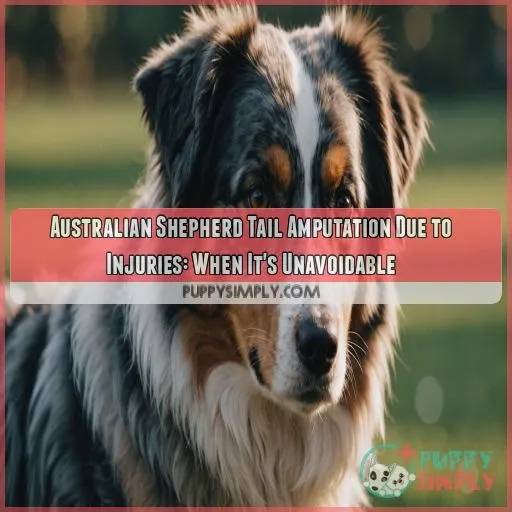
Thanks to advancement inveterinary care , tail amputation can be a successful and relatively safe function when done with a unmortgaged discernment of the fundament ’s anatomy and social occasion .
By exploring vulgar trauma , diagnosis , and handling options , you ’ll be considerably equip to makeinformed decisionsabout your furred friend ’s caution .
And , as you learn more about tail amputation and its implications , you ’ll be well on your fashion to becoming a savvy , compassionate companion .
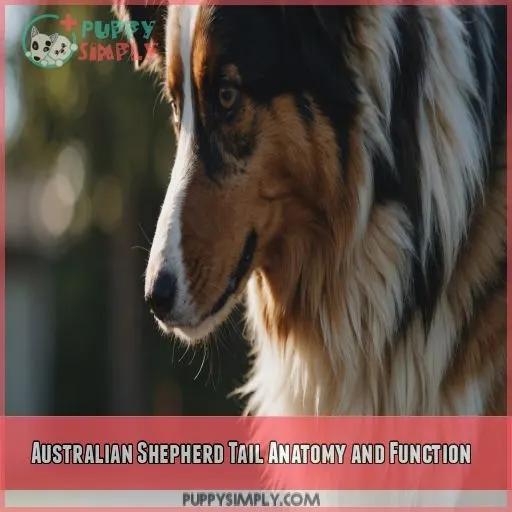
Table Of Contents
Key Takeaways
Australian Shepherd Tail Anatomy and Function
You might suppose your Aussie ’s tail is just for wagging , but it ’s a complex social organization with important functions . Understanding yourAustralian Shepherd ’s tailanatomy and how it works can help you tell apart potential emergence and keep your furry friend healthy and glad .
Tail Structure and Vertebrae
Your Australian Shepherd ’s poop is made up of 19 - 23 vertebra , which give it flexibility and movement .
Thecaudal musclescontrol its wagging motion , whilenerve innervationhelps with sensation .
The blood supply is essential for keeping the tail healthy .
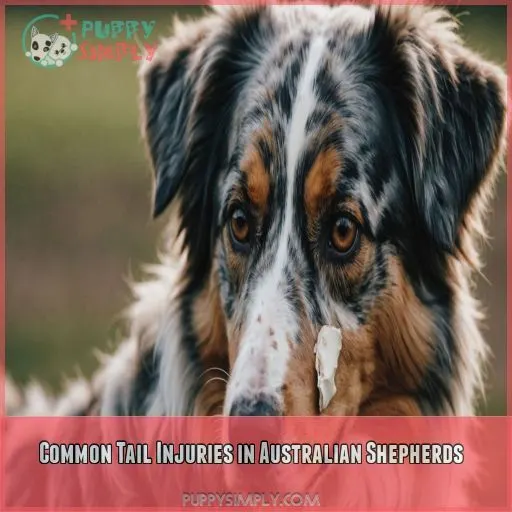
Understanding the derriere ’s physical body can help you make informed decisions if your Aussie suffer an injury that may requiretail amputation .
Role in Balance and Communication
Your Australian Shepherd ’s tail play a crucial purpose in their balance and communication .
Their tail acts like acounterbalance , aid them make sharp turns while herd or playing .
It ’s also an essential instrument forcanine formula , conveying emotion like excitation , fear , or felicity .
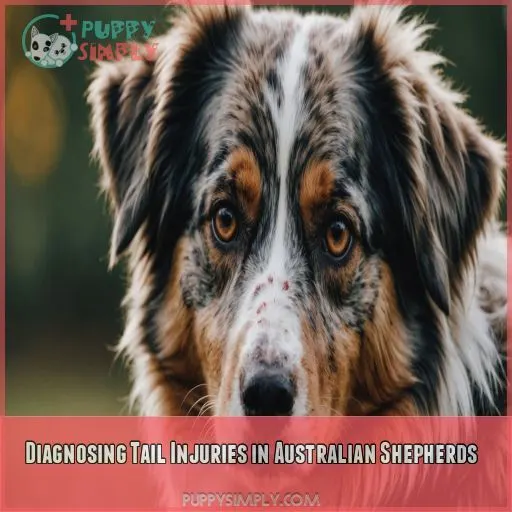
Breed-Specific Tail Characteristics
Now that you know how important tails are for balance and communicating , let ’s babble about what makes theAustralian Shepherd ’s tail unequaled .
This stock ’s tail is typicallymedium - length , feathered , and carry low when relaxed .
According to breed standards , a dock tail is n’t required , but some possessor favor it for appearance . Ironically , rude tailsare now widely take and even preferred in many strain nightclub .
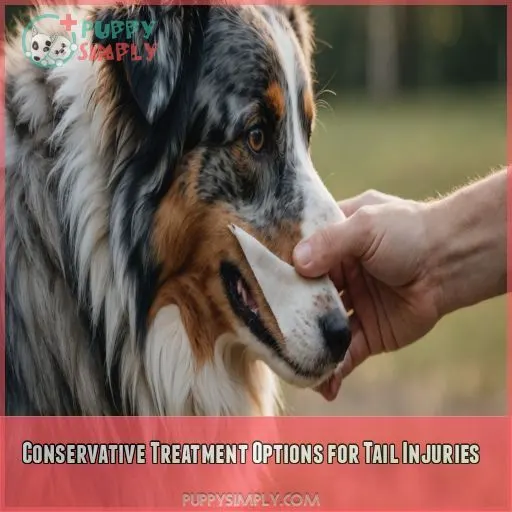
give your Aussie a lovely , authentic expression .
Common Tail Injuries in Australian Shepherds
As an Australian Shepherd owner , you ’re in all likelihood no unknown to the grandness of your dog ’s tail in their daily aliveness .
You may not be aware of the uncouth tail injuries that can impress them , such as Happy Tail Syndrome , trauma - stimulate injuries , avulsion trauma , and degenerative buns weather .
These injuries can be painful and potentially lead to long - term harm or even ask tail amputation .
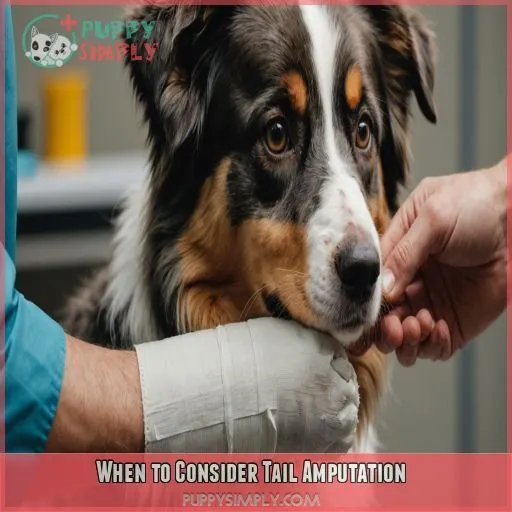
This is why it ’s essential to recognize the signs and symptom to provide your furry friend with the best potential care .
Happy Tail Syndrome
You sleep together the pleasure of see to it yourAustralian Shepherd ’s waggle seat ? But what if that ebullience contribute toHappy Tail Syndrome ? This painful condition take place when their tail hits object repeatedly , make injury . bar is primal : considertail wrappingmethods or adjust their environment to thin tail waggle vividness .
Trauma-Induced Injuries
If your Australian Shepherd experience a traumatic wound , like being hit by a car or caught in a room access , it can be annihilating . hindquarters traumacan have severe infliction , bleeding , and swelling . Prompt veterinary attention is crucial for proper wound cleansing , hemostasis , and tension - free closure to promote healing .
Avulsion Injuries
You ’re care with an avulsion trauma , where your Australian Shepherd ’s tail skin and soft tissue are pull off from the ivory . This abominable injury can moderate to hemorrhage , contagion , and avulsion fault . straightaway veterinary maintenance , pain management , and rehabilitation techniques are substantive to prevent complicatedness and promote healing .
Degenerative Tail Conditions
lease ’s babble about degenerative empennage atmospheric condition that can impress your Australian Shepherd . These can be irritating and affect their timber of life . Some plebeian conditions include :
Diagnosing Tail Injuries in Australian Shepherds
If your Australian Shepherd has suffered a prat injury , you ’re probably worried and uncertain about the full grade of action .
To shape the extent of the damage and decide on the most effective treatment plan , your veterinarian will perform a thoroughphysical examination . This examination may be accompany by imaging tests , a neurologic assessment , and an evaluation of your Canis familiaris ’s pain and mobility .
An precise diagnosis is the first step in find out the best course of action . Your vet will use a combining of physical examination , imaging method , neurological judgement , and pain and mobility evaluation to diagnose the extent of the injury .

This diagnosing will help decide if tail amputation is unavoidable , at last conduct in the direction of the serious treatment .
Physical Examination Techniques
rent ’s get hands - on ! To diagnose hindquarters injury in your Australian Shepherd , your veterinarian will usephysical examen techniqueslike tactual exploration , ocular review , reach testing , sensitiveness assessment , and reflex evaluation . These methods help identify pain , gibbousness , or numbness , guiding the next stone’s throw in your weenie ’s care andtail injury direction .
Imaging Methods (X-rays, MRI, CT)
You ’re trying to figure out what ’s going on with your Australian Shepherd ’s injured tail . Imaging methods like ecstasy - rays , MRI , and CT CAT scan can help . These radiology techniques provide a clear picture of the damage , but retrieve to prioritizeX - ray safetyand considerMRI limitations . Cosmetic concerns take a backseat here .
Neurological Assessment
When evaluating yourAustralian Shepherd ’s tail injury , aneurological evaluationis vital . Your vet will habituate painful sensation response tests , sensory evaluation methods , andmotor routine analysisto verification for nerve damage . automatic examination techniques and cognitive office checks will also help determine the good form of action for your furred Quaker .
Pain and Mobility Evaluation
Now that we ’ve cover neurologic assessment , let ’s babble out botheration and mobility evaluation . Your veterinarian will perform a gait psychoanalysis to measure your Australian Shepherd ’s movement and pain scoring to gauge their discomfort horizontal surface . They may also commend mobility assist , dogtooth rehabilitation , or sensitivity threshold testing to develop a treatment plan .
Conservative Treatment Options for Tail Injuries
If your Australian Shepherd has suffered a tail injury , you ’re believably worried about what come next and want to explore all your option before surgical procedure . Fortunately , many tail end injuries can be managed with conservative treatment options , which may include a combination of repose , bandaging , pain direction , and strong-arm therapy to help oneself your furry acquaintance heal and regain their signature swagman .
Rest and Activity Restriction
Now that you ’ve diagnosed your Australian Shepherd ’s bum injury , it ’s time to give them a prison-breaking – literally!Rest and activityrestriction are key for healing . demarcation line exercise to short , easy walks and nullify strenuous activity for 7 - 10 days . supervise their advance and conform their routine as needed .
Bandaging and Protective Devices
Now that your Australian Shepherd is get some rest , it ’s time to recall about protect that wound tail . You ’ll want to stabilize the injury and prevent further damage . Here are some alternative :
Pain Management Strategies
Now that you ’ve bandaged your Australian Shepherd ’s injured shadow , it ’s time to tacklepain direction . Your vet will lead you on pain medicament options , and you’re able to also explore alternate therapies like acupuncture or optical maser therapy . As the owner , it ’s your responsibility to supervise your dog ’s comfort and adjust their care plan consequently .
Physical Therapy and Rehabilitation
Now that you ’ve mother a solid bother direction plan , it ’s fourth dimension to get moving with physical therapy and reclamation . This is all important in help your Aussie retrieve strength , mobility , and sureness after a fanny wound . Here are some example to get you started :
When to Consider Tail Amputation
You ’re present a hard decision about your Australian Shepherd ’s injured tail , and you ’re inquire if amputation is the in effect alternative . Let ’s explore the situation where tail amputation might be unavoidable , include severe trauma eccentric , continuing non - healing injuries , and lineament of animation considerations that may lead your veterinarian to recommend this course of activeness .
Severe Trauma Cases
If your Australian Shepherd have severe injury , such as a car accident or brutal attack , tail amputation might be necessary . Respond promptly with emergency brake veterinary upkeep ( reservoir ) to prevent further complications . Accident bar backsheesh , like supervising off - collar play , can also minimize risk . Your veteran will point you through the problematic decisions ( Source ) .
Chronic Non-Healing Injuries
continuing non - sanative harm can be a tail amputation game - changer . You ’re likely fagged fromwound care challenge , pain direction strategy , and dodging contagion risk factors . If your Aussie ’s tail is more wounded than help , it ’s time to count amputation decision measure . Setrehabilitation goalsand study what ’s upright for their time to come .
Quality of Life Considerations
You ’re weigh the tough determination of tail amputation for your Australian Shepherd . moot how it ’ll impact their quality of life sentence . recall about pain direction , excited well - being , and behavioral adaptations . Will they still bask social interaction and playtime ? Mobility adjustment can be made , but prioritise their comfort and felicity .
Veterinary Recommendations
Your veterinarian will recommendtail amputationif your Australian Shepherd ’s injury is severe , non - healing , or impacting theirquality of living . They ’ll consider botheration direction , alternative treatments , and post - op care . believe their expertise and discuss concern openly . Together , you ’ll make an informed decision that prioritize your andiron ’s well - being and puff .
Tail Amputation Procedure in Australian Shepherds
When you ’re facing the hard decision of hindquarters amputation for your Australian Shepherd , it ’s important to empathise the cognitive process so you’re able to find confident about your dog-iron ’s comfort and retrieval .
This section will take the air you through the tail amputation process , cover pre - operative formulation , anesthesia and pain in the neck ascendence , surgical technique , and post - operative care .
This way , you ’ll make love what to expect every footprint of the way .
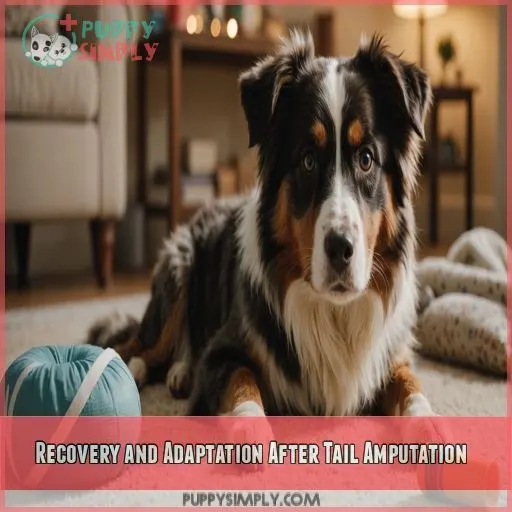
Pre-operative Preparation
It ’s meter to prep your Aussie for surgery . A thorough pre - operativehealth appraisal will identify potential risks . Your vet will discuss anesthesia danger , and educate you on post - op charge . The operative site will be cleaned and prepped . A solid design will help your furry friend have a liquid recovery .
Anesthesia and Pain Control
Okay , so you ’ve made the tough call about your Aussie ’s tail and now you ’re think about anesthesia and bother management . It ’s a heavy deal to verify your pup is comfortable and good during the surgery . Here ’s the lowdown –
Surgical Techniques
Now that your Australian Shepherd is under anesthesia , the surgical squad will carefullydisinfect the areaand prepare the necessary instruments . The veterinarian will then make a precise incision , carefully dissect the tissue , andremove the damaged portionof the hindquarters , strike care to minimize bleeding and promote smooth wound closure .
Post-operative Care
After surgery , your Australian Shepherd ’s recovery is exceedingly important . Focus on infliction management , wound healing , and activity restriction to forestall complication . At home , provide a quiet place , supervise the combat injury , and follow your veterinary ’s instructions . Schedulefollow - up appointmentsto verify everything goes swimmingly and to accost any concerns you may have .
Recovery and Adaptation After Tail Amputation
help your Australian Shepherd recuperate from tail amputation is a journey that postulate patience and savvy .
You ’ll want to focus on wound healing , keeping a close center on their behavior , and addressing any prospicient - term effects on their counterpoise and communicating .
Remember that your weenie will demand some meter to adjust to their new body after the amputation .
With patience , love , and careful watchfulness , your dog will adapt and learn to thrive without their tail .
Wound Healing and Monitoring
As you recover from yourAustralian Shepherd ’s tail amputation , it ’s really important to keep a close eye on how the wound is healing . Here ’s a agile guide to help you check that you ’re doing the right thing :
Behavioral Changes and Adjustment
As you adjust to life with a docked posterior , you ’ll comment changes in your behavior . You might initially find a minute off - remainder or uncertain . But with fourth dimension and patience , you ’ll conform to your new routine .
Long-term Effects on Balance and Communication
After your Aussie’stail amputation , you ’ll need to adapt to raw shipway of communication . Here are some change to gestate :
These change will help your Aussie correct and thrive after rump amputation .
Owner Support and Education
As you navigate the recovery process , call up that you ’re not alone . Your veterinarian will cater guidance onpost - operating theatre care , and you may also seek support from on-line forums orbreed - specificgroups . Keep in mind that every dog adapts otherwise , so be patient and focus on your Aussie ’s unique penury .
Frequently Asked Questions (FAQs)
When to amputate a dog’s tail?
suppose your furry friend ’s butt , once wagging with excitation , now spite and make distress . Amputateyour dog ’s tail when combat injury are life-threatening , such ashappy tail syndromeor hurt , and other treatments have n’t worked , prioritizing their comfort and well - being .
Why do they cut the tails off of Australian shepherds?
You ’re wonder why some Australian Shepherds have theirtails cut off ? candidly , it ’s often due to diachronic stock standard and enhancive preferences , but theAmerican Veterinary Medical Associationrecommends against it for non - medical reasons .
What happens if a dog’s tail is injured?
If your dog ’s can gets injured , it ’s really important to see avetright away . Your ex-serviceman will assure out the damage and differentiate you what to do next , which might include bandaging , antibiotics , or evenamputationif the wound is serious .
What is an avulsion injury in a dog’s tail?
Anavulsion injuryin a dog ’s tail is a afflictive tear or pull that separates skin from the inherent tissue .
It ’s a severe harm where the tail is partially or in full snap off , often need immediateveterinary attention .
think a million flyspeck cheek endings holler in agony – that ’s rough what your poor pup feels with an avulsion injury , where their tail skin is literally draw off from the bone , causingexcruciating pain .
Imagine a hurting so sharp , it feels like a thousand knives jab at once – that ’s what an avulsion injury in a frankfurter ’s tail might be like .
This injury often requiresimmediate veterinary attentionto prevent infection and boost healing .
What is the average cost of tail injury treatment in Australian Shepherds?
When treating your dog ’s shadower injury , costs can vary , but you may ask to pay around $ 500 to $ 1,000 or more , depending on the rigour and the penury for operating room , vet attention , or recapitulate treatments .
Is tail docking still a common practice in Australian Shepherd breeders?
as luck would have it , many Australian Shepherd breeders are forgoingtail docking , focusing on function over way . You ’ll find more breeders prioritize puppy ’ welfare , as veterinary and owner increasingly realise the unnecessary risks associated with this superannuated practice .
Can tail injuries in Australian Shepherds be prevented through training and exercise?
you may reduce the endangerment oftail injuriesin your dog through trainingand use ! Teach your furry friend to avoid criticize their tail into objective , and engage them in fun activities that promote easy wagging .
How do veterinarians determine if an Australian Shepherd requires tail amputation?
Imagine being in the vet ’s shoes ! As you examine your furry friend , they ’re match for signs of severe accidental injury , transmission , or irreversible damage – if the tail ’s beyond hangout , amputationmight be the tolerant choice .
Can a docked tail affect an Australian Shepherds working ability and overall performance?
When considering adocked tail , you ’re in all likelihood wonder if it ’ll affect your Aussie’sworking abilityand performance . The answer is , it might . A docked tail assembly can affect their balance and piloting , but many adapt and thrive with right grooming and care .
Conclusion
Facing a million - to - one decision about your Aussie ’s tail can be overwhelming .
Understanding whenAustralian Shepherdtail amputationdue to injury is unavoidable can be a life buoy .
With a clear hold of quarter anatomy , common injury , and intervention option , you ’ll be empowered to make informed choices .